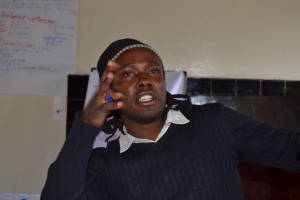The Kenyan governmental plan to build a $ 2 billion coal-fired power plant in the area known as Kwasasi in Lamu county is facing continuous growing resistance from community members and activists, actively mobilising and working to stop a project which is likely to cause health damages to communities, contaminate water resources and decimate mangrove forests of this region rich in both ecological and cultural diversity.
Save Lamu, a coalition of over 30 community organizations based in Lamu County, is actively working on this campaign. The coalition is a consortium of grassroot environmental, youth, women and religious groups. Beside meetings held with government, community and religious leaders, Save Lamu is also focusing on other community outreach programmes like educational talks, door-to-door mobilisation and screening of coal related documentaries. In addition, the campaign has organised radio talk shows where medical experts detailed the impacts of coal on people’s health and well-being. In collaboration with 350 Kenya, Save Lamu will be utilizing soon artivism tactics for stronger mobilizations, especially towards youths.

350 Kenya and Save Lamu will start soon utilizing artivism as a key tactic for youth mobilization in Lamu
By intensifying this campaign, leaders and allies of Save Lamu hope to engage the government to examine alternative energy production instead of coal power. Communities and local stakeholders are unsatisfied with ESIA process of Amu Power because it lacks meaningful consultations between all stakeholders and in depth information on the negative effects of burning coal for electricity. “ We at Save Lamu we are totally pro renewables and anti coal. There is nothing at all as ‘clean coal’. Coal is a dirty energy, and by all means we strongly campaign against any plans to build a coal plant in Lamu” said Omar Elmawi before adding “In the past we had a few community members visit South Africa to learn and assess the degree of the damages that coal has on the people and the environment. From the findings, we are convinced that we have to keep coal and all forms of fossil fuels underground.”
Coal power is widely known to produce environmental hazards and organizers believe that these hazards cannot be sufficiently addressed to protect the fragility of the local ecosystems on which the Lamu communities are highly dependent. Many actors, both national and international, have already warned of the big risk of irreparable loss and damage following the building of the coal power plant and its associated transformations. Last year the Unesco’s World Heritage Committee report clearly indicated that “there can be no doubt that a project of this scale and scope, in an area as remote and protected as Lamu, cannot help but have profound negative impacts on the heritage.”
Recognised as a UNESCO World Heritage site, Lamu is home to a rich ecological and cultural diversity that have been attracting thousands of tourists in the recent years. “With this project, residents of Lamu will suffer not only from the consequences related to health and water, but also their incomes and well-being in general will be affected as many of them are highly dependent on fishing and local tourism as the major livelihood strategies” said Prince Papa, from 350 Kenya.
“That’s why as a team which have been mobilizing for climate issues, combating this coal-fired plant is a priority. It is our responsibility to bring together our collective efforts and resist any kind of pressure to stop the coal project and rather plan a future based on renewable energy,” added Papa. He indicated that some leaders of Save Lamu have recently passed under government pressure, others threatened by anonymous phone calls and they have had their offices searched by armed police. Yet, this harassment has not stopped Save Lamu from advocating for the rights of the Lamu community to live in a healthy and clean environment powered by renewable energy.
